University Nursing Essay: Religion, Culture, and Healthcare Decisions
VerifiedAdded on 2022/11/19
|8
|1524
|150
Essay
AI Summary
This essay explores the intricate relationship between religion, culture, and healthcare, focusing on ethical considerations and patient autonomy within nursing practice. It examines a case study involving a patient, James, whose health condition necessitates medical intervention, but whose father, Mike, expresses reservations due to his religious beliefs. The essay delves into the debates surrounding patient autonomy versus the importance of medical treatment, referencing scholarly articles that emphasize the limitations of cultural values when a patient's health is at stake. It also discusses the historical perspectives of Christianity towards suffering and the acceptance of medical interventions, including organ donation. Furthermore, the essay highlights the significance of spiritual assessment in healthcare, emphasizing the role of healthcare professionals in accommodating patients' religious and spiritual beliefs while ensuring the best possible care. The conclusion stresses the importance of empathy and systematic intervention in balancing religious and spiritual needs with medical treatment.
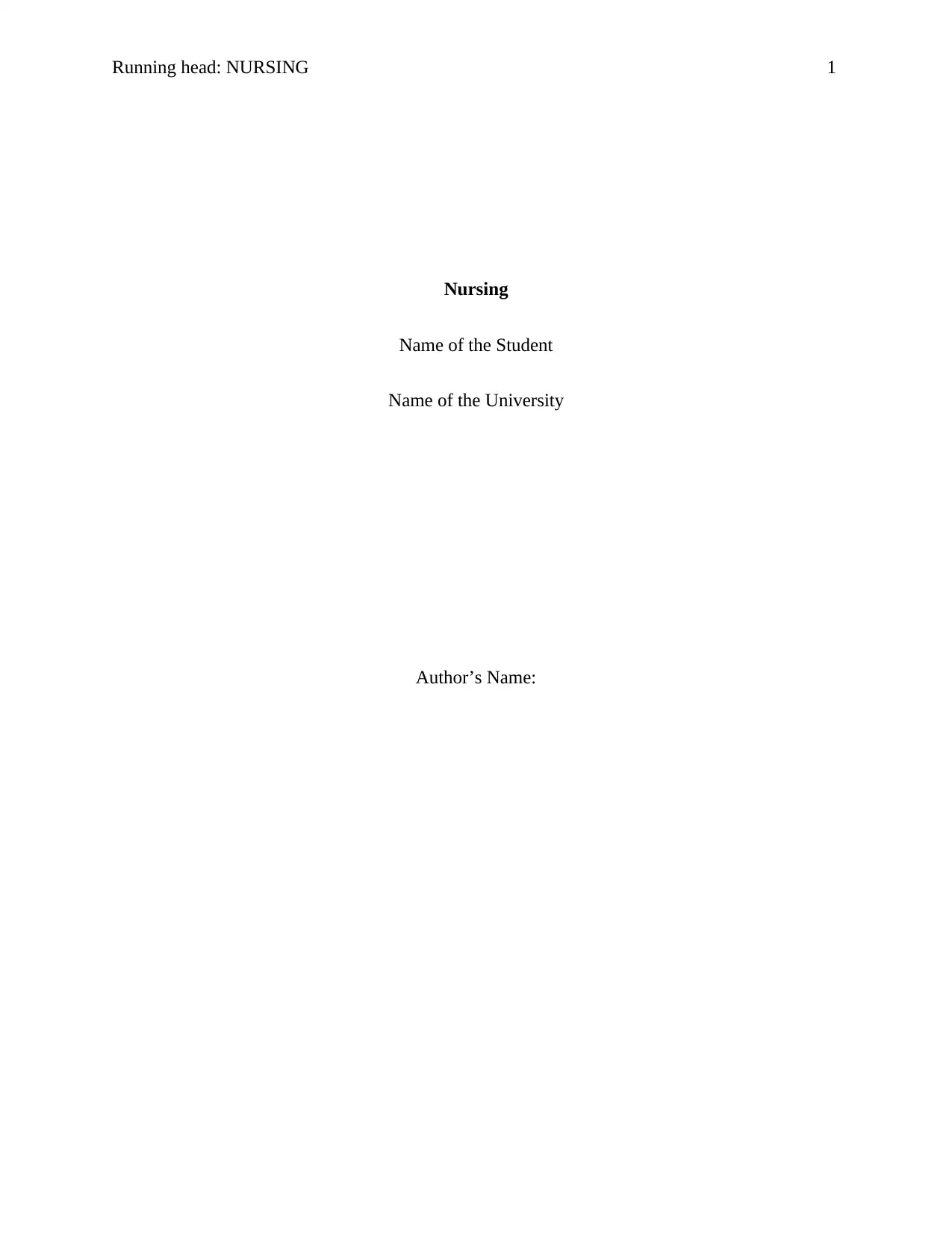
Running head: NURSING 1
Nursing
Name of the Student
Name of the University
Author’s Name:
Nursing
Name of the Student
Name of the University
Author’s Name:
Paraphrase This Document
Need a fresh take? Get an instant paraphrase of this document with our AI Paraphraser
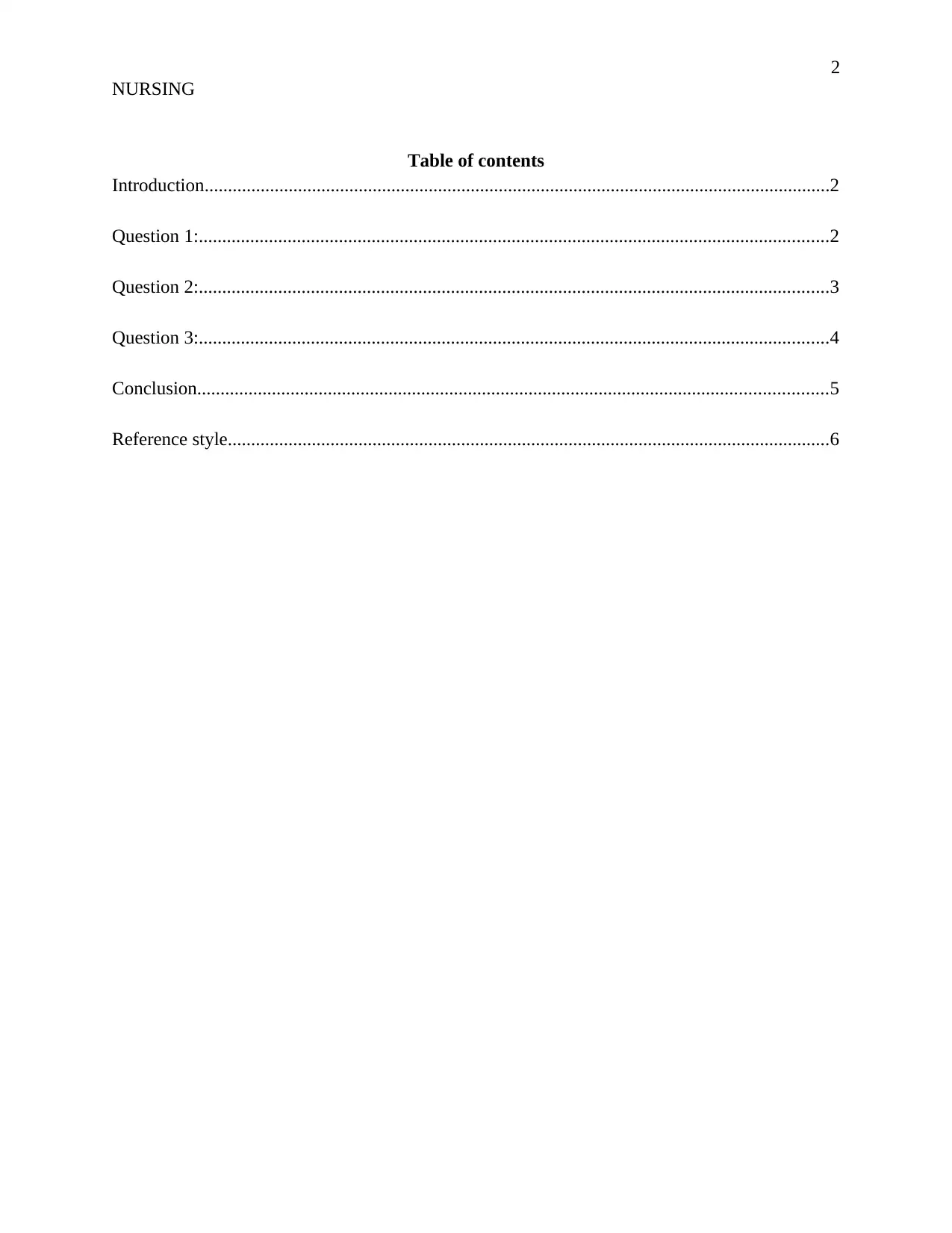
2
NURSING
Table of contents
Introduction......................................................................................................................................2
Question 1:.......................................................................................................................................2
Question 2:.......................................................................................................................................3
Question 3:.......................................................................................................................................4
Conclusion.......................................................................................................................................5
Reference style.................................................................................................................................6
NURSING
Table of contents
Introduction......................................................................................................................................2
Question 1:.......................................................................................................................................2
Question 2:.......................................................................................................................................3
Question 3:.......................................................................................................................................4
Conclusion.......................................................................................................................................5
Reference style.................................................................................................................................6
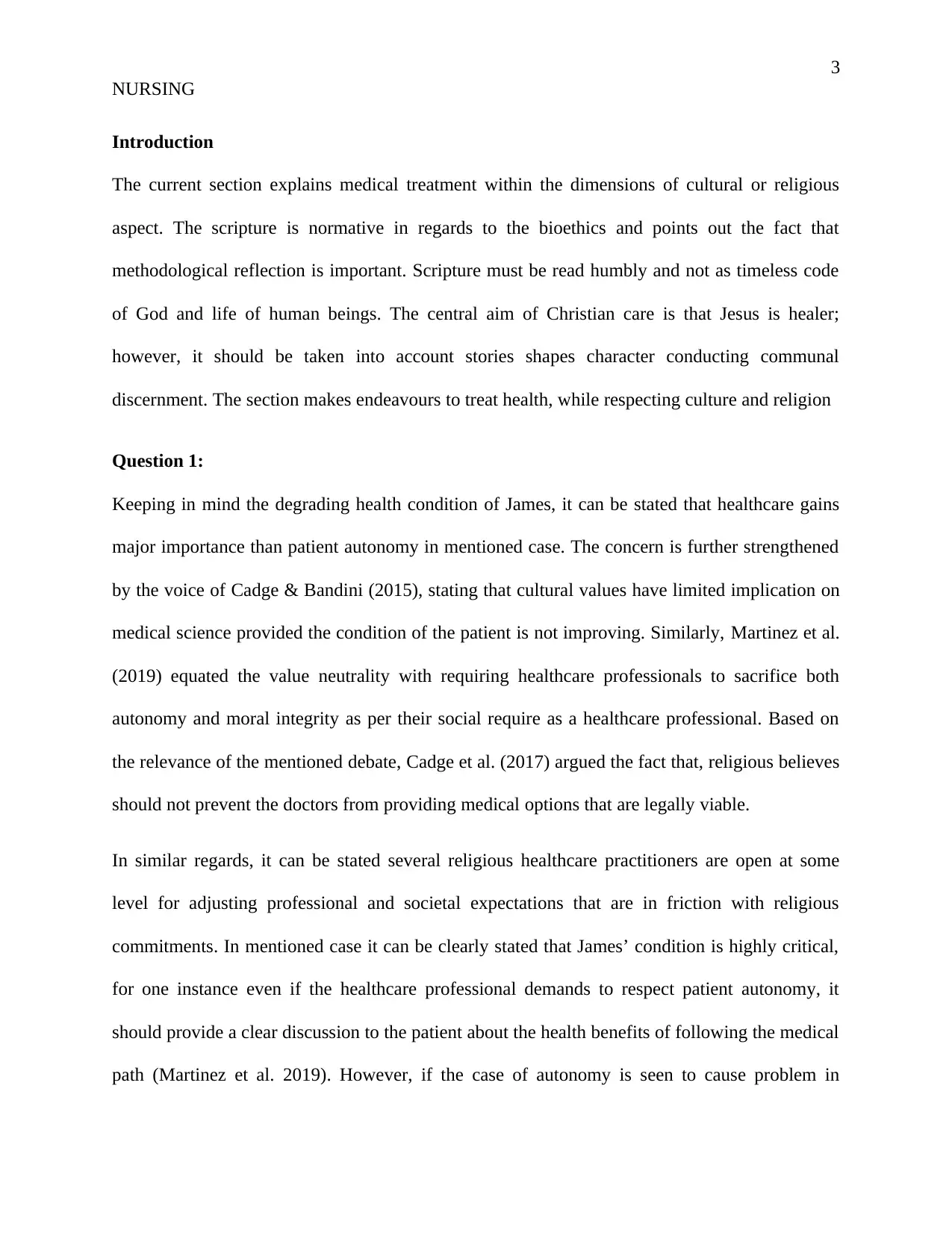
3
NURSING
Introduction
The current section explains medical treatment within the dimensions of cultural or religious
aspect. The scripture is normative in regards to the bioethics and points out the fact that
methodological reflection is important. Scripture must be read humbly and not as timeless code
of God and life of human beings. The central aim of Christian care is that Jesus is healer;
however, it should be taken into account stories shapes character conducting communal
discernment. The section makes endeavours to treat health, while respecting culture and religion
Question 1:
Keeping in mind the degrading health condition of James, it can be stated that healthcare gains
major importance than patient autonomy in mentioned case. The concern is further strengthened
by the voice of Cadge & Bandini (2015), stating that cultural values have limited implication on
medical science provided the condition of the patient is not improving. Similarly, Martinez et al.
(2019) equated the value neutrality with requiring healthcare professionals to sacrifice both
autonomy and moral integrity as per their social require as a healthcare professional. Based on
the relevance of the mentioned debate, Cadge et al. (2017) argued the fact that, religious believes
should not prevent the doctors from providing medical options that are legally viable.
In similar regards, it can be stated several religious healthcare practitioners are open at some
level for adjusting professional and societal expectations that are in friction with religious
commitments. In mentioned case it can be clearly stated that James’ condition is highly critical,
for one instance even if the healthcare professional demands to respect patient autonomy, it
should provide a clear discussion to the patient about the health benefits of following the medical
path (Martinez et al. 2019). However, if the case of autonomy is seen to cause problem in
NURSING
Introduction
The current section explains medical treatment within the dimensions of cultural or religious
aspect. The scripture is normative in regards to the bioethics and points out the fact that
methodological reflection is important. Scripture must be read humbly and not as timeless code
of God and life of human beings. The central aim of Christian care is that Jesus is healer;
however, it should be taken into account stories shapes character conducting communal
discernment. The section makes endeavours to treat health, while respecting culture and religion
Question 1:
Keeping in mind the degrading health condition of James, it can be stated that healthcare gains
major importance than patient autonomy in mentioned case. The concern is further strengthened
by the voice of Cadge & Bandini (2015), stating that cultural values have limited implication on
medical science provided the condition of the patient is not improving. Similarly, Martinez et al.
(2019) equated the value neutrality with requiring healthcare professionals to sacrifice both
autonomy and moral integrity as per their social require as a healthcare professional. Based on
the relevance of the mentioned debate, Cadge et al. (2017) argued the fact that, religious believes
should not prevent the doctors from providing medical options that are legally viable.
In similar regards, it can be stated several religious healthcare practitioners are open at some
level for adjusting professional and societal expectations that are in friction with religious
commitments. In mentioned case it can be clearly stated that James’ condition is highly critical,
for one instance even if the healthcare professional demands to respect patient autonomy, it
should provide a clear discussion to the patient about the health benefits of following the medical
path (Martinez et al. 2019). However, if the case of autonomy is seen to cause problem in
⊘ This is a preview!⊘
Do you want full access?
Subscribe today to unlock all pages.

Trusted by 1+ million students worldwide
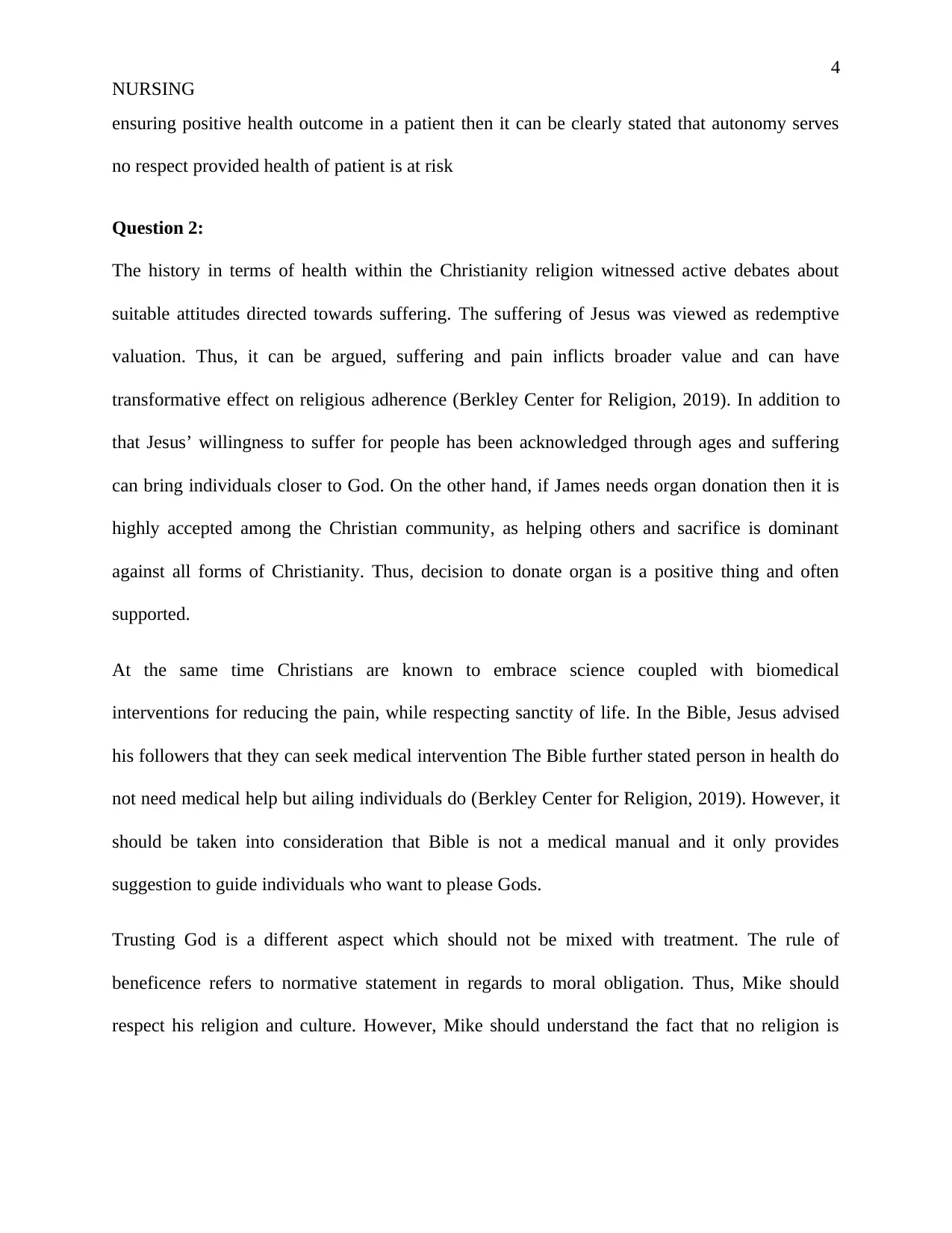
4
NURSING
ensuring positive health outcome in a patient then it can be clearly stated that autonomy serves
no respect provided health of patient is at risk
Question 2:
The history in terms of health within the Christianity religion witnessed active debates about
suitable attitudes directed towards suffering. The suffering of Jesus was viewed as redemptive
valuation. Thus, it can be argued, suffering and pain inflicts broader value and can have
transformative effect on religious adherence (Berkley Center for Religion, 2019). In addition to
that Jesus’ willingness to suffer for people has been acknowledged through ages and suffering
can bring individuals closer to God. On the other hand, if James needs organ donation then it is
highly accepted among the Christian community, as helping others and sacrifice is dominant
against all forms of Christianity. Thus, decision to donate organ is a positive thing and often
supported.
At the same time Christians are known to embrace science coupled with biomedical
interventions for reducing the pain, while respecting sanctity of life. In the Bible, Jesus advised
his followers that they can seek medical intervention The Bible further stated person in health do
not need medical help but ailing individuals do (Berkley Center for Religion, 2019). However, it
should be taken into consideration that Bible is not a medical manual and it only provides
suggestion to guide individuals who want to please Gods.
Trusting God is a different aspect which should not be mixed with treatment. The rule of
beneficence refers to normative statement in regards to moral obligation. Thus, Mike should
respect his religion and culture. However, Mike should understand the fact that no religion is
NURSING
ensuring positive health outcome in a patient then it can be clearly stated that autonomy serves
no respect provided health of patient is at risk
Question 2:
The history in terms of health within the Christianity religion witnessed active debates about
suitable attitudes directed towards suffering. The suffering of Jesus was viewed as redemptive
valuation. Thus, it can be argued, suffering and pain inflicts broader value and can have
transformative effect on religious adherence (Berkley Center for Religion, 2019). In addition to
that Jesus’ willingness to suffer for people has been acknowledged through ages and suffering
can bring individuals closer to God. On the other hand, if James needs organ donation then it is
highly accepted among the Christian community, as helping others and sacrifice is dominant
against all forms of Christianity. Thus, decision to donate organ is a positive thing and often
supported.
At the same time Christians are known to embrace science coupled with biomedical
interventions for reducing the pain, while respecting sanctity of life. In the Bible, Jesus advised
his followers that they can seek medical intervention The Bible further stated person in health do
not need medical help but ailing individuals do (Berkley Center for Religion, 2019). However, it
should be taken into consideration that Bible is not a medical manual and it only provides
suggestion to guide individuals who want to please Gods.
Trusting God is a different aspect which should not be mixed with treatment. The rule of
beneficence refers to normative statement in regards to moral obligation. Thus, Mike should
respect his religion and culture. However, Mike should understand the fact that no religion is
Paraphrase This Document
Need a fresh take? Get an instant paraphrase of this document with our AI Paraphraser
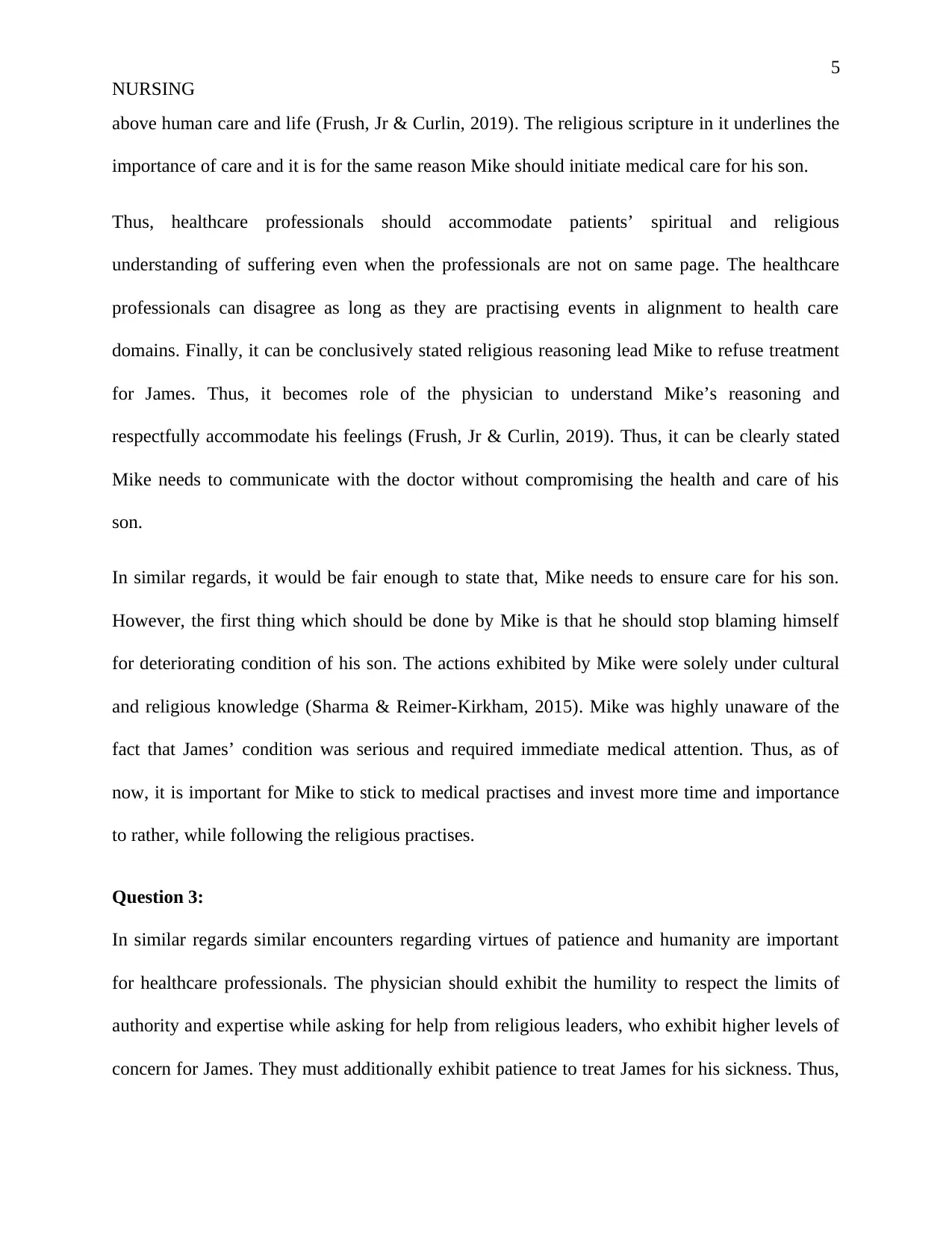
5
NURSING
above human care and life (Frush, Jr & Curlin, 2019). The religious scripture in it underlines the
importance of care and it is for the same reason Mike should initiate medical care for his son.
Thus, healthcare professionals should accommodate patients’ spiritual and religious
understanding of suffering even when the professionals are not on same page. The healthcare
professionals can disagree as long as they are practising events in alignment to health care
domains. Finally, it can be conclusively stated religious reasoning lead Mike to refuse treatment
for James. Thus, it becomes role of the physician to understand Mike’s reasoning and
respectfully accommodate his feelings (Frush, Jr & Curlin, 2019). Thus, it can be clearly stated
Mike needs to communicate with the doctor without compromising the health and care of his
son.
In similar regards, it would be fair enough to state that, Mike needs to ensure care for his son.
However, the first thing which should be done by Mike is that he should stop blaming himself
for deteriorating condition of his son. The actions exhibited by Mike were solely under cultural
and religious knowledge (Sharma & Reimer-Kirkham, 2015). Mike was highly unaware of the
fact that James’ condition was serious and required immediate medical attention. Thus, as of
now, it is important for Mike to stick to medical practises and invest more time and importance
to rather, while following the religious practises.
Question 3:
In similar regards similar encounters regarding virtues of patience and humanity are important
for healthcare professionals. The physician should exhibit the humility to respect the limits of
authority and expertise while asking for help from religious leaders, who exhibit higher levels of
concern for James. They must additionally exhibit patience to treat James for his sickness. Thus,
NURSING
above human care and life (Frush, Jr & Curlin, 2019). The religious scripture in it underlines the
importance of care and it is for the same reason Mike should initiate medical care for his son.
Thus, healthcare professionals should accommodate patients’ spiritual and religious
understanding of suffering even when the professionals are not on same page. The healthcare
professionals can disagree as long as they are practising events in alignment to health care
domains. Finally, it can be conclusively stated religious reasoning lead Mike to refuse treatment
for James. Thus, it becomes role of the physician to understand Mike’s reasoning and
respectfully accommodate his feelings (Frush, Jr & Curlin, 2019). Thus, it can be clearly stated
Mike needs to communicate with the doctor without compromising the health and care of his
son.
In similar regards, it would be fair enough to state that, Mike needs to ensure care for his son.
However, the first thing which should be done by Mike is that he should stop blaming himself
for deteriorating condition of his son. The actions exhibited by Mike were solely under cultural
and religious knowledge (Sharma & Reimer-Kirkham, 2015). Mike was highly unaware of the
fact that James’ condition was serious and required immediate medical attention. Thus, as of
now, it is important for Mike to stick to medical practises and invest more time and importance
to rather, while following the religious practises.
Question 3:
In similar regards similar encounters regarding virtues of patience and humanity are important
for healthcare professionals. The physician should exhibit the humility to respect the limits of
authority and expertise while asking for help from religious leaders, who exhibit higher levels of
concern for James. They must additionally exhibit patience to treat James for his sickness. Thus,
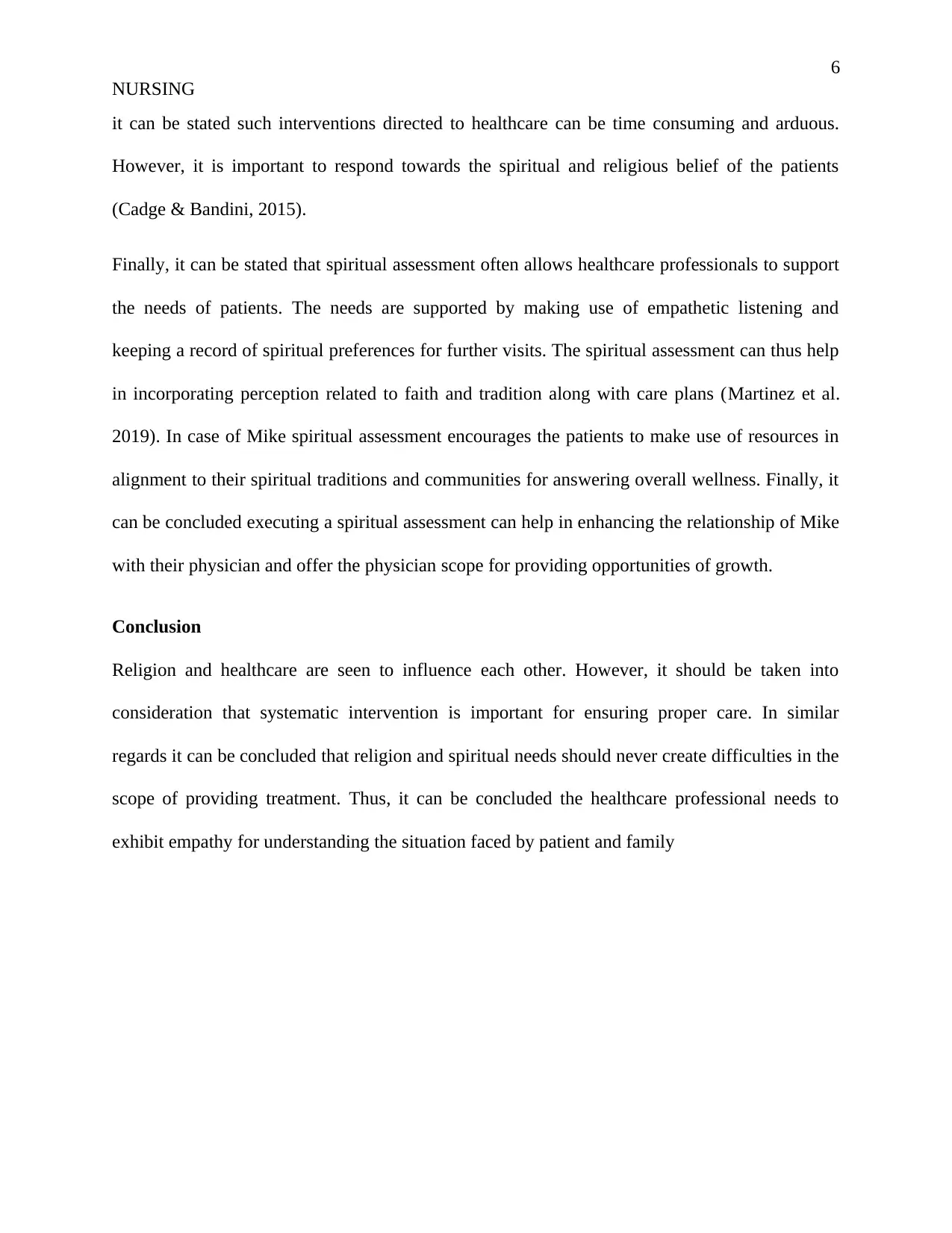
6
NURSING
it can be stated such interventions directed to healthcare can be time consuming and arduous.
However, it is important to respond towards the spiritual and religious belief of the patients
(Cadge & Bandini, 2015).
Finally, it can be stated that spiritual assessment often allows healthcare professionals to support
the needs of patients. The needs are supported by making use of empathetic listening and
keeping a record of spiritual preferences for further visits. The spiritual assessment can thus help
in incorporating perception related to faith and tradition along with care plans (Martinez et al.
2019). In case of Mike spiritual assessment encourages the patients to make use of resources in
alignment to their spiritual traditions and communities for answering overall wellness. Finally, it
can be concluded executing a spiritual assessment can help in enhancing the relationship of Mike
with their physician and offer the physician scope for providing opportunities of growth.
Conclusion
Religion and healthcare are seen to influence each other. However, it should be taken into
consideration that systematic intervention is important for ensuring proper care. In similar
regards it can be concluded that religion and spiritual needs should never create difficulties in the
scope of providing treatment. Thus, it can be concluded the healthcare professional needs to
exhibit empathy for understanding the situation faced by patient and family
NURSING
it can be stated such interventions directed to healthcare can be time consuming and arduous.
However, it is important to respond towards the spiritual and religious belief of the patients
(Cadge & Bandini, 2015).
Finally, it can be stated that spiritual assessment often allows healthcare professionals to support
the needs of patients. The needs are supported by making use of empathetic listening and
keeping a record of spiritual preferences for further visits. The spiritual assessment can thus help
in incorporating perception related to faith and tradition along with care plans (Martinez et al.
2019). In case of Mike spiritual assessment encourages the patients to make use of resources in
alignment to their spiritual traditions and communities for answering overall wellness. Finally, it
can be concluded executing a spiritual assessment can help in enhancing the relationship of Mike
with their physician and offer the physician scope for providing opportunities of growth.
Conclusion
Religion and healthcare are seen to influence each other. However, it should be taken into
consideration that systematic intervention is important for ensuring proper care. In similar
regards it can be concluded that religion and spiritual needs should never create difficulties in the
scope of providing treatment. Thus, it can be concluded the healthcare professional needs to
exhibit empathy for understanding the situation faced by patient and family
⊘ This is a preview!⊘
Do you want full access?
Subscribe today to unlock all pages.

Trusted by 1+ million students worldwide
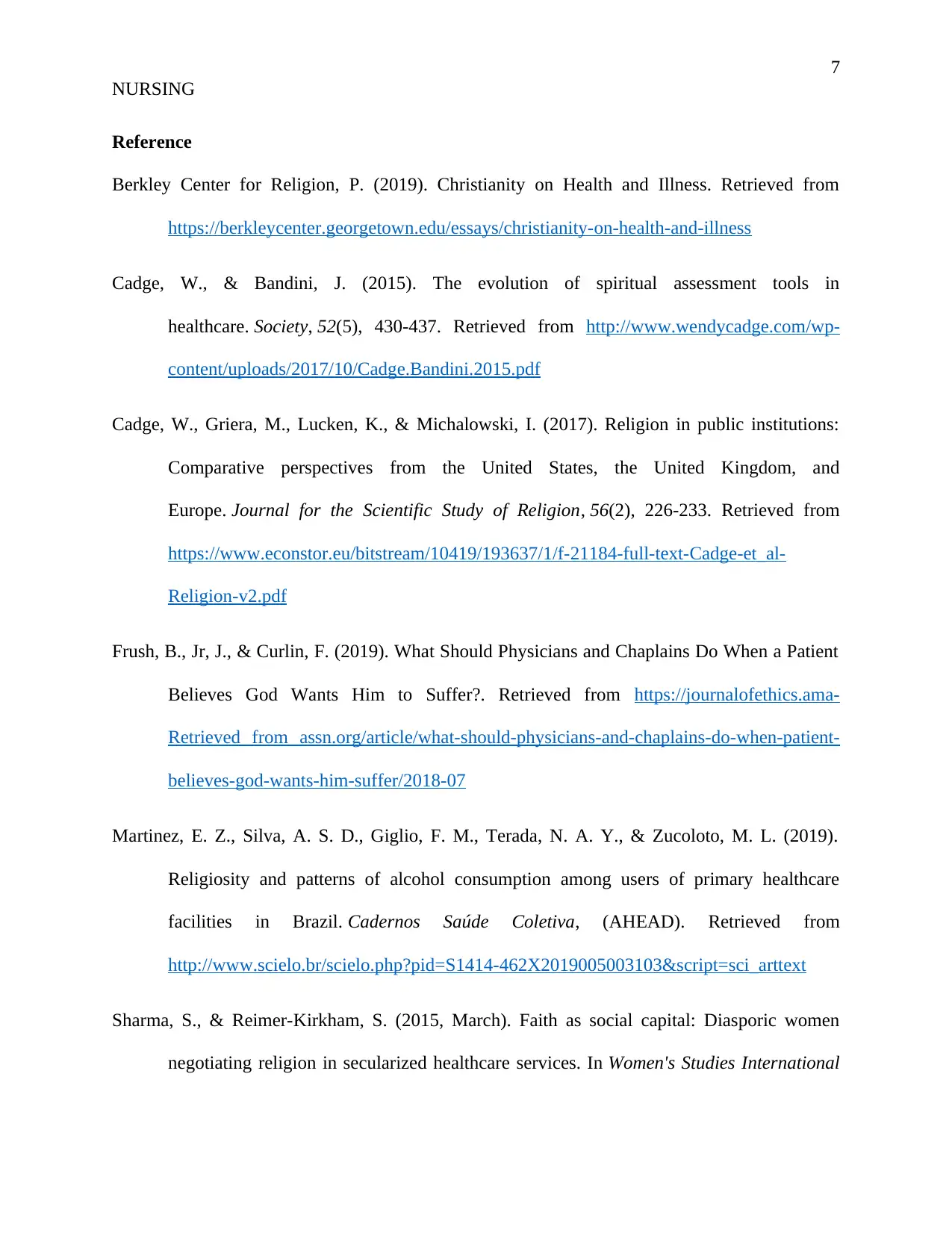
7
NURSING
Reference
Berkley Center for Religion, P. (2019). Christianity on Health and Illness. Retrieved from
https://berkleycenter.georgetown.edu/essays/christianity-on-health-and-illness
Cadge, W., & Bandini, J. (2015). The evolution of spiritual assessment tools in
healthcare. Society, 52(5), 430-437. Retrieved from http://www.wendycadge.com/wp-
content/uploads/2017/10/Cadge.Bandini.2015.pdf
Cadge, W., Griera, M., Lucken, K., & Michalowski, I. (2017). Religion in public institutions:
Comparative perspectives from the United States, the United Kingdom, and
Europe. Journal for the Scientific Study of Religion, 56(2), 226-233. Retrieved from
https://www.econstor.eu/bitstream/10419/193637/1/f-21184-full-text-Cadge-et_al-
Religion-v2.pdf
Frush, B., Jr, J., & Curlin, F. (2019). What Should Physicians and Chaplains Do When a Patient
Believes God Wants Him to Suffer?. Retrieved from https://journalofethics.ama-
Retrieved from assn.org/article/what-should-physicians-and-chaplains-do-when-patient-
believes-god-wants-him-suffer/2018-07
Martinez, E. Z., Silva, A. S. D., Giglio, F. M., Terada, N. A. Y., & Zucoloto, M. L. (2019).
Religiosity and patterns of alcohol consumption among users of primary healthcare
facilities in Brazil. Cadernos Saúde Coletiva, (AHEAD). Retrieved from
http://www.scielo.br/scielo.php?pid=S1414-462X2019005003103&script=sci_arttext
Sharma, S., & Reimer-Kirkham, S. (2015, March). Faith as social capital: Diasporic women
negotiating religion in secularized healthcare services. In Women's Studies International
NURSING
Reference
Berkley Center for Religion, P. (2019). Christianity on Health and Illness. Retrieved from
https://berkleycenter.georgetown.edu/essays/christianity-on-health-and-illness
Cadge, W., & Bandini, J. (2015). The evolution of spiritual assessment tools in
healthcare. Society, 52(5), 430-437. Retrieved from http://www.wendycadge.com/wp-
content/uploads/2017/10/Cadge.Bandini.2015.pdf
Cadge, W., Griera, M., Lucken, K., & Michalowski, I. (2017). Religion in public institutions:
Comparative perspectives from the United States, the United Kingdom, and
Europe. Journal for the Scientific Study of Religion, 56(2), 226-233. Retrieved from
https://www.econstor.eu/bitstream/10419/193637/1/f-21184-full-text-Cadge-et_al-
Religion-v2.pdf
Frush, B., Jr, J., & Curlin, F. (2019). What Should Physicians and Chaplains Do When a Patient
Believes God Wants Him to Suffer?. Retrieved from https://journalofethics.ama-
Retrieved from assn.org/article/what-should-physicians-and-chaplains-do-when-patient-
believes-god-wants-him-suffer/2018-07
Martinez, E. Z., Silva, A. S. D., Giglio, F. M., Terada, N. A. Y., & Zucoloto, M. L. (2019).
Religiosity and patterns of alcohol consumption among users of primary healthcare
facilities in Brazil. Cadernos Saúde Coletiva, (AHEAD). Retrieved from
http://www.scielo.br/scielo.php?pid=S1414-462X2019005003103&script=sci_arttext
Sharma, S., & Reimer-Kirkham, S. (2015, March). Faith as social capital: Diasporic women
negotiating religion in secularized healthcare services. In Women's Studies International
Paraphrase This Document
Need a fresh take? Get an instant paraphrase of this document with our AI Paraphraser
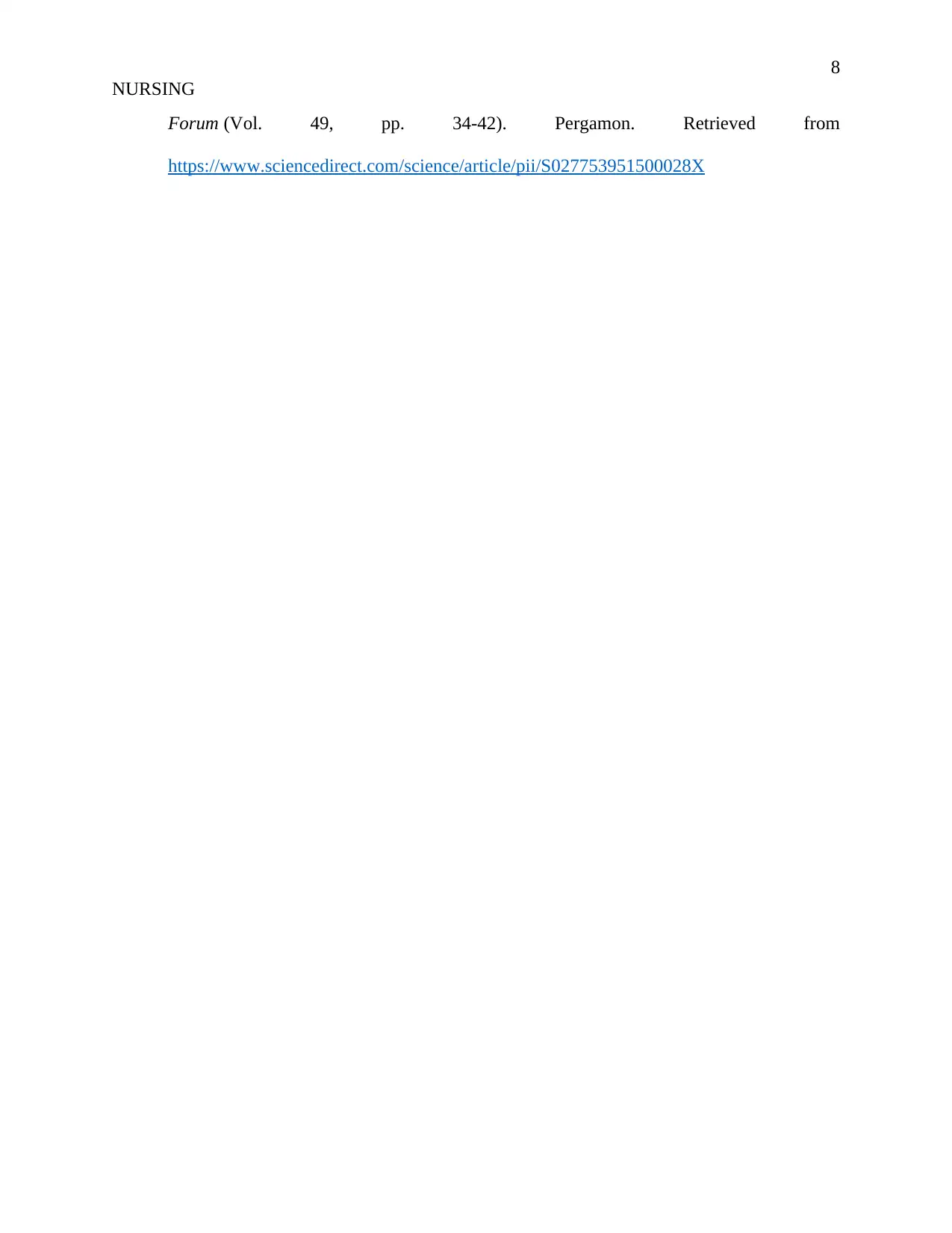
8
NURSING
Forum (Vol. 49, pp. 34-42). Pergamon. Retrieved from
https://www.sciencedirect.com/science/article/pii/S027753951500028X
NURSING
Forum (Vol. 49, pp. 34-42). Pergamon. Retrieved from
https://www.sciencedirect.com/science/article/pii/S027753951500028X
1 out of 8
Related Documents
Your All-in-One AI-Powered Toolkit for Academic Success.
+13062052269
info@desklib.com
Available 24*7 on WhatsApp / Email
![[object Object]](/_next/static/media/star-bottom.7253800d.svg)
Unlock your academic potential
Copyright © 2020–2025 A2Z Services. All Rights Reserved. Developed and managed by ZUCOL.





